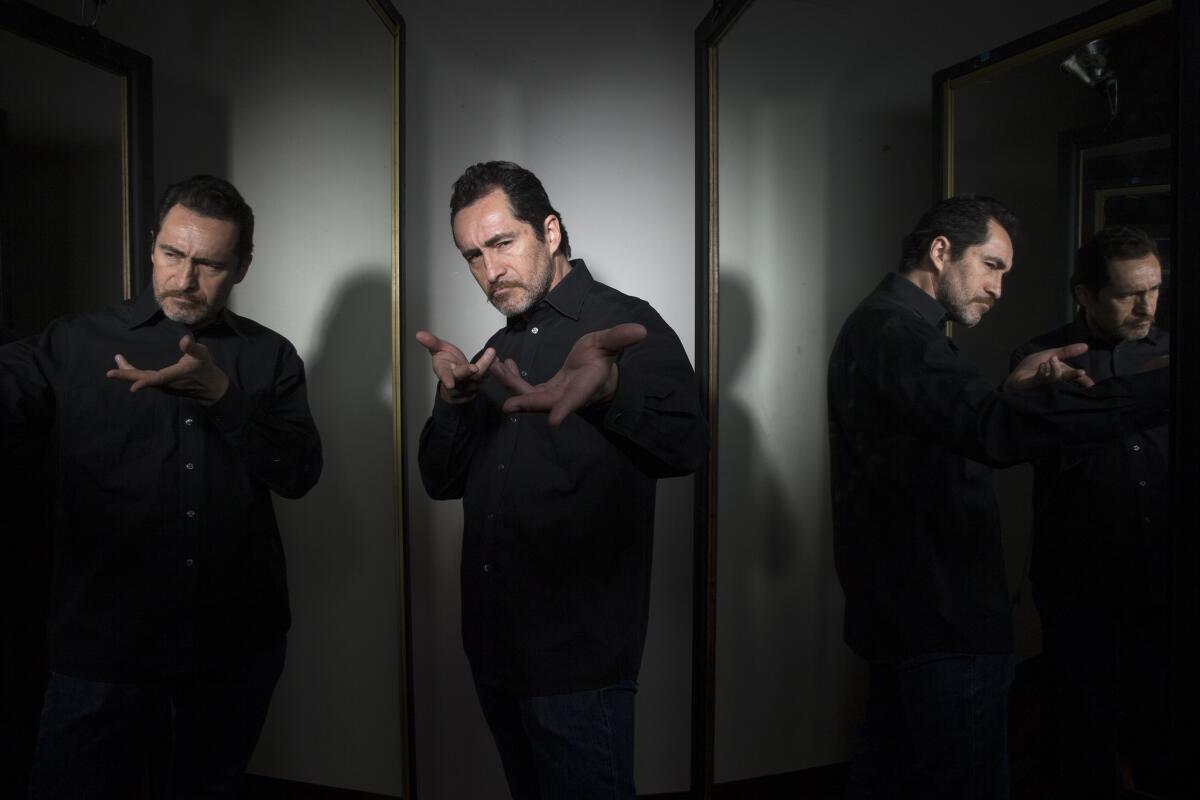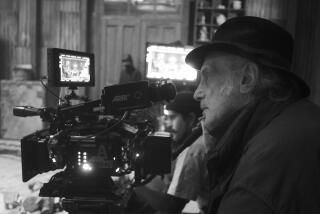Demian Bichir plays it cool in ‘Zoot Suit’

Demian Bichir is quite attached to his hat.
“I sleep with it, take showers with it,” the 2012 lead actor Oscar nominee says after finishing the day’s rehearsal for the Mark Taper Forum revival of “Zoot Suit.”
He holds out the sleek, black fedora for closer inspection. It is at once reserved and dandyish, with a brim that sweeps up in back into what look like vintage Cadillac tail fins. Tucked into its matching ebony band is a little explosion of color: a gray-green and red feather.
By essentially living in this custom-made beauty, Bichir stays constantly connected to El Pachuco, the impeccably dressed host, narrator and mythic zoot suiter he portrays in Luis Valdez’s play about Mexican American devotees of zoot suit style who were arrested and tried en masse after a 1942 Los Angeles killing.
Such immersion is typical of the 53-year-old Mexico City-raised, bilingual, dual-citizen actor.
Chris Weitz, who directed Bichir in his Oscar-nominated role as an undocumented L.A. gardener in “A Better Life,” recalls: “He bought a truck off the street, a pretty broken-down pickup of the kind that you see all around the city being used by gardeners. He wanted to drive around and live like that guy for a while.”
Told of Weitz’s testimonial, Bichir laughs and shrugs it off. But the people who see him in action are impressed. “He wants to get into the skin of the character as much as possible,” Weitz says. “He sees acting as a way to form deep empathy with people and convey what he’s learned to an audience.”
Ridley Scott, Bichir’s director on the forthcoming film “Alien: Covenant,” says by email that the actor is “full of enthusiasm and ideas — always with great questions and solutions.”
Embedded among those qualities is determination, which drove Bichir, a rising young actor in Mexico, to spend years in the States in his 20s to perfect his English and try to land the sorts of American movies headlined by Pacino, De Niro, Nicholson and other actors he admired. The attempt sputtered, but that didn’t stop him from trying again after an Oscar-equivalent Ariel award and other high-profile successes in Mexico.
Since making the leap by portraying a powder-keg Fidel Castro in the two-part 2008 biopic “Che,” he’s shape-shifted through such diverse roles as a Russian gangster in “Dom Hemingway,” an FBI boss in “The Heat” and a furry, piano-playing outlaw in “The Hateful Eight,” as well as the devilishly charming crime-lord and mayor in the Showtime series “Weeds” and the psychologically tortured detective on FX’s “The Bridge.”
SIGN UP for the free Essential Arts & Culture newsletter »
Theater saturated the home in which Bichir grew up as the middle son in what has become one of Mexico’s great acting families. His parents are actor-director Alejandro Bichir and TV and film actress Maricruz Nájera, and his brothers are actors Odiseo and Bruno Bichir.
Bichir, who first performed on stage at age 3 and at 17 was directed in his first leading role by Tony winner Jose Quintero, returns to the theater when he can. When he heard about the Taper’s revival of its landmark 1978 production of “Zoot Suit,” he sought an interview with playwright-director Valdez to detail his vision for the role. An actor who these days works with the likes of Oliver Stone, Quentin Tarantino and Scott wanted to walk the boards again in a role that made a strong impression on him in his teens when he saw Valdez’s film version of the play.
“This is high literature,” says Bichir, folded into a rehearsal room chair. “This is a play that should not take 40 years to be re-staged. Like Tennessee Williams and Arthur Miller and Shakespeare, this is a classic.”
He talks about playwrights with the same enthusiasm that he could about soccer or baseball. In his early teens, he was so mad for soccer that he trained to play professionally. But theater kept whispering in his ear — as did his father, who offered this beautifully concise bit of advice: “I know you love soccer, Demian, but don’t ever forget, the theater loves you more.”
Bichir describes his “Zoot Suit” character as “a wise man, a wizard, a shaman. He’s good and he’s bad and he’s hideous and virtuous and he’s profane and reverential. He’s a trickster, a joker; he’s life and death.
“El Pachuco represents all Mexicans since the beginning of time.”
El Pachuco is invisible to everyone but 21-year-old lead character Henry Reyna, a commanding figure among the youth of his neighborhood and a zoot suit adherent who, with 21 others, is charged with murder and put on trial. Functioning as Reyna’s alter ego, El Pachuco helps the young man withstand aggressive policing, a sensationalistic press and early war hysteria in this play inspired by the 1942 Sleepy Lagoon Murder in Los Angeles and subsequent quash of young zoot suiters.
“The role requires a certain presence of mind and body and spirit that is more akin to leading roles in Shakespeare,” Valdez says in a separate interview. It also comes with a towering legacy: Edward James Olmos’ crackling original performance.
THE HISTORY: Former Times theater writer recalls the earliest days of “Zoot Suit” decades ago »
“We were looking for someone distinctive, someone who could take on the legacy that Eddie Olmos created, but at the same time bring something new and unique to the role,” Valdez says. “Demian brings a slightly older Pachuco” — Olmos was 31 when he created the part — “with a different kind of depth. He has this tremendous sense of maturity about him; he’s a gentleman.”
Trim and muscular, the actor has another quality that a stop at the gym on the way home will help to keep honed. “He has tremendous sex appeal,” Valdez says, “and the Pachuco should have that quality. That’s part of his magic.”
Bichir is curious to see how a new generation will react to the play.
“The timing,” he adds, “couldn’t be more perfect. This play talks very clearly about discrimination and racism, and it’s a big criticism to fascism and stupidity and ignorance.
“And that is precisely where we are living right now: Whenever we see someone different than us — who dresses differently, speaks differently, acts differently — instead of putting ourselves in their shoes we immediately disconnect.”
On screen Bichir will be seen in “Lowriders,” opening May 12, as an L.A. father struggling to connect with two rebellious sons. A week later comes the release of “Alien: Covenant,” in which Bichir plays chief of security on the Covenant spacecraft as it conducts a colonizing mission.
Branching out, he wrote, directed, co-produced and acts in “Un Cuento de Circo & A Love Song,” which has been playing at film festivals. Stefanie Sherk, his girlfriend, is one of the leads.
Theater is the taproot for it all. When Bichir was growing up in Mexico City, his parents were actors with a roving theater company. The boys were taken along.
His mother, speaking from Mexico City, recalls: “He would learn what I would say and at home he’d act out what he saw us do in the theater.”
As his interest in acting grew, she and her husband advised “that he should fall in love with every character that he plays, that he has to have an iron discipline, that he had to fall in love with the profession.”
Of their close-knit family, younger brother Bruno says by email that “all my memories are about talking about theater, acting, films, music, art.”
“We see theater as a temple. But also [it] is our playground.”
Finishing his long day of “Zoot Suit” rehearsal, Bichir concludes: “I guess we got enchanted. We got beautifully contaminated” by “the backstage and the smell of it, the wardrobe and the fake mustaches, this make-believe type of world. It’s magical; it’s just beautiful.”
Cecilia Sanchez in The Times’ Mexico City bureau contributed to this report.
‘Zoot Suit’
Where: Mark Taper Forum, 135 N. Grand Ave., L.A.
When: 8 p.m. Tuesdays-Fridays, 2:30 and 8 p.m. Saturdays, 1 and 6:30 p.m. Sundays. In previews; opens Feb. 12. Ends March 19.
Tickets: $25-$99 (subject to change)
Information: (213) 628-2772 or www.centertheatregroup.org
Twitter: @darylhmiller
More to Read
The biggest entertainment stories
Get our big stories about Hollywood, film, television, music, arts, culture and more right in your inbox as soon as they publish.
You may occasionally receive promotional content from the Los Angeles Times.







